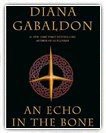Outlander aka Cross Stitch - Gabaldon Diana (читать книгу онлайн бесплатно полностью без регистрации .TXT) 📗
“Good morrow to you, ladies,” said the leader. He was a corporal, but not, I was pleased to see, Corporal Hawkins. A quick glance showed me that none of the men were among those I had seen at Fort William, and I relaxed my grip on the handle of my basket just a fraction.
“We saw the mill from above,” the dragoon said, “and thought perhaps to purchase a sack of meal?” He divided a bow between us, not sure who to address.
Mrs. MacNab was frosty, but polite.
“Good morrow,” she said, inclining her head. “But if ye’ve come for meal, I fear me ye’ll be sair disappointit. The mill wheel’s nae workin’ just now. Perhaps next time ye come this way.”
“Oh? What’s amiss, then?” The corporal, a short young man with a fresh complexion, seemed interested. He walked down to the edge of the pond to peer at the wheel. The miller, popping up in the mill to report the latest progress with the millstone, saw him and hastily popped back down out of sight.
The corporal called to one of his men. Climbing up the slope, he gestured to the other soldier, who obligingly stooped to let the corporal climb on his back. Reaching up, he managed to catch the edge of the roof with both hands, and squirmed up onto the thatch. Standing, he could barely reach the edge of the great wheel. He reached out and rocked it with both hands. Bending down, he shouted through the window to the miller to try turning the millstone by hand.
I willed myself to keep my eyes away from the bottom of the sluice. I wasn’t sufficiently familiar with the workings of waterwheels to know for sure, but I was afraid that if the wheel gave way suddenly, anything near the underwater works might be crushed. Apparently this was no idle fear, for Mrs. MacNab spoke sharply to one of the soldiers near us.
“Ye should ca’ your master doon now, laddie. He’ll do no good tae the mill or himsel’. Ye shouldna meddle wi’ things as ye dinna understand.”
“Oh, you’ve no cause for worry, missus,” said the soldier casually. “Corporal Silvers’s father has a wheat mill in Hampshire. What the Corporal doesn’t know about waterwheels would fit in me shoe.”
Mrs. MacNab and I exchanged looks of alarm. The corporal, after a bit more clambering up and down and exploratory rockings and pokings, came down to where we sat. He was perspiring freely, and wiped his red face with a large, grubby handkerchief before addressing us.
“I can’t move it from above, and that fool of a miller doesn’t seem to speak any English at all.” He glanced at Mrs. MacNab’s sturdy stick and gnarled limbs, then at me. “Perhaps the young lady could come and talk to him for me?”
Mrs. MacNab stretched out a protective hand, gripping me by the sleeve.
“Ye’ll hae to pardon my daughter-in-law, sorr. She’s gone sair saft in the heid, ever syne her last babe was stillborn. Hasna spoke a word in ower a year, puir lassie. And I canna leave her for a minute, for fear she’ll throw hersel’ intae the water in her grief.”
I did my best to look soft-headed, no great effort in my present state of mind.
The corporal looked disconcerted. “Oh,” he said. “Well…” He wandered down to the edge of the pond and stood frowning into the water. He looked just as Jamie had an hour before, and apparently for the same reason.
“No help for it, Collins,” he said to the old trooper. “I’ll have to go under and see what’s holding it.” He took off his scarlet coat and began to unfasten the cuffs of his shirt. I exchanged looks of horror with Mrs. MacNab. While there might be sufficient air under the millhouse for survival, certainly there was not room to hide very effectively.
I was considering, not very optimistically, the chances of throwing a convincing epileptic fit, when the great wheel suddenly creaked overhead. With a sound like a tree being murdered, the big arc made a swooping half-turn, stuck for a moment, then rolled into a steady revolution, scoops merrily pouring bright streamlets into the sluice.
The corporal paused in his undressing, admiring the arc of the wheel.
“Look at that, Collins! Wonder what was stuck in it?”
As though in answer, something came into sight at the top of the wheel. It hung from one of the scoops, sodden red folds dripping. The scoop hit the stream now churning down the sluice, the object came loose, and Jamie’s father’s erstwhile drawers floated majestically out onto the waters of the millpond.
The elderly trooper fished them out with a stick, presenting them gingerly to his commander, who plucked them off the stick like a man obliged to pick up a dead fish.
“Hm,” he said, holding up the garment critically. “Wonder where on earth that came from? Must have been caught around the shaft. Curious that something like that could cause so much trouble, isn’t it, Collins?”
“Yessir.” The trooper plainly did not consider the interior workings of a Scottish mill wheel to be of absorbing interest, but answered politely.
After turning the cloth over a time or two, the corporal shrugged, and used it to wipe the dirt from his hands.
“Decent bit of flannel,” he said, wringing out the sopping cloth. “It’ll do to polish tack, at least. Something of a souvenir, eh, Collins?” And with a polite bow to Mrs. MacNab and me, he turned to his horse.
The dragoons had barely disappeared from sight over the brow of the hill when a splashing from the millpond heralded the rising from the depths of the resident water sprite.
He was the bloodless white, blue-tinged, of Carrara marble, and his teeth chattered so hard that I could barely make out his first words, which were, in any case, in Gaelic.
Mrs. MacNab had no trouble making them out, and her ancient jaw dropped. She snapped it shut, though, and made a low reverence toward the emergent laird. Seeing her, he stopped his progress toward the shore, the water still lapping modestly about his hips. He took a deep breath, clenching his teeth to stop the chattering, and plucked a streamer of duckweed off his shoulder.
“Mrs. MacNab,” he said, bowing to his elderly tenant.
“Sir,” she said, bowing back once again. “A fine day, is it no?”
“A bit b-brisk,” he said, casting an eye at me. I shrugged helplessly.
“We’re pleased to see ye back in yer home, sir, and it’s our hope, the lads and mysel’, as you’ll soon be back to stay.”
“Mine too, Mrs. MacNab,” Jamie said courteously. He jerked his head at me, glaring. I smiled blandly.
The old lady, ignoring this byplay, folded her gnarled hands in her lap and settled back with dignity.
“I’ve a wee favor I was wishin’ to ask of your lairdship,” she began, “havin’ tae do wi’-”
“Grannie MacNab,” Jamie interrupted, advancing a menacing half-step through the water, “whatever your wish is, I’ll do it. Provided only that ye’ll give me back my shirt before my parts fall off wi’ cold.”
Chapter 29. MORE HONESTY
In the evenings, when supper was cleared away, we generally sat in the drawing room with Jenny and Ian, talking companionably of this and that, or listening to Jenny’s stories.
Tonight, though, it was my turn, and I held Jenny and Ian rapt as I told them about Mrs. MacNab and the Redcoats.
“God kens well enough that boys need to be smacked, or he’d no fill them sae full o’ the de’il.” My imitation of Grannie MacNab brought down the house.
Jenny wiped tears of laughter from her eyes.
“Lord, it’s true enough. And she’d know it too. What has she got, Ian, eight boys?”
Ian nodded. “Aye, at least. I canna even remember all their names; seemed like there was always a couple of MacNabs about to hunt or fish or swim with, when Jamie and I were younger.”
“You grew up together?” I asked. Jamie and Ian exchanged wide, complicitous grins.
“Oh, aye, we’re familiar,” Jamie said, laughing. “Ian’s father was the factor for Lallybroch, like Ian is now. On a number of occasions during my reckless youth, I’ve found myself standing elbow to elbow with Mr. Murray there, explaining to one or other of our respective fathers how appearances can be deceiving, or failing that, why circumstances alter cases.”



